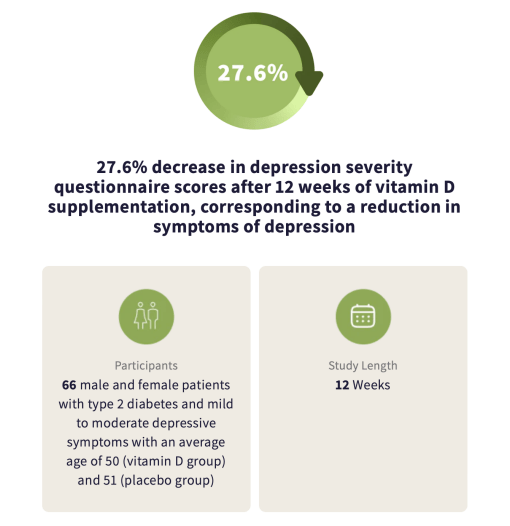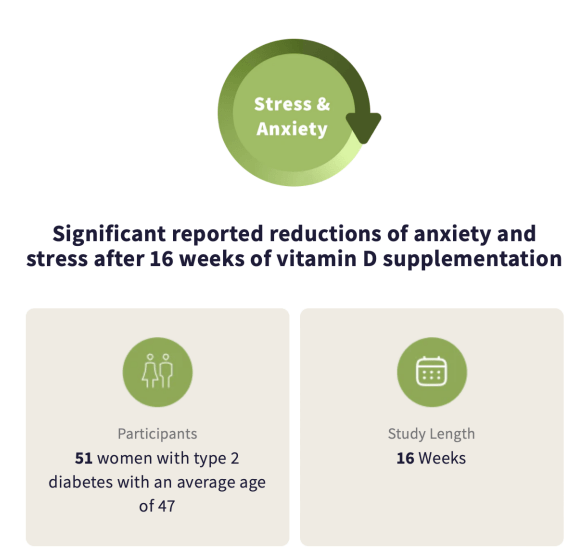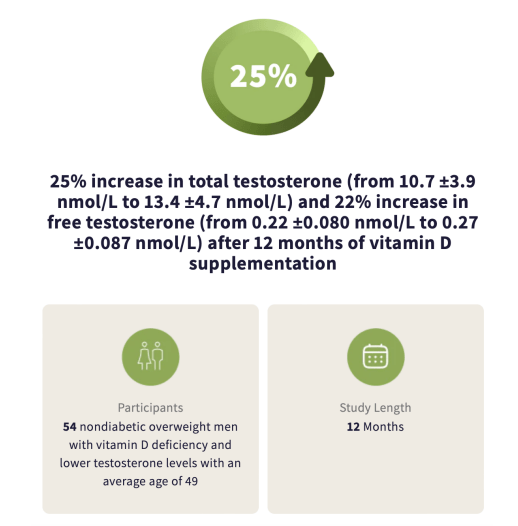Here’s what the research shows:
To Summarize: Clinical research has found associations between Vitamin D supplementation
and increased testosterone, decreased inflammation, improved immunity, mental health and
overall wellbeing.
Vitamin D is produced by your skin in response to sunlight, and is vital for overall health and
wellbeing. Studies have illustrated that Vitamin D…
- Boosts Bone Health
- Supports Immune System
- Improves Muscle Function
- May Lower Risk of Chronic Diseases
- Enhances Mood and Mental Health
- Supports Pregnancy Health
- Regulates Insulin Levels
- Influences Gene Expression

However, a large proportion of the population in the UK, USA and other countries in the Global
North suffer from Vitamin D deficiency due to a lack of exposure to sunlight. This has serious
implications:
- Bone Health Issues
- Increased Risk of Fractures
- Muscle Weakness
- Immune System Dysfunction
- Mood Changes and Mental Health
- Increased Risk of Cardiovascular Diseases
- Impaired Wound Healing
- Chronic Fatigue and Tiredness
- Complications During Pregnancy
- Increased Risk of Certain Cancers
Therefore, it may be worthwhile to consider incorporating a Vitamin D supplement into your daily
routine – particularly during the winter months.
This article highlights five scientific studies whose results support these claims.
STUDY 1: Depression.

- Study Design: Randomized, double-blind, placebo-controlled trial.
- Objective: To assess the effect of vitamin D on depressive symptoms in type 2 diabetic
patients without using antidepressants. - Methods: Depression measured by a 21-item self-report questionnaire. Participants: 66
patients with type 2 diabetes, mild to moderate depression, average age 50-51 years. - Intervention: 100 μg/day (4000 IU/day) of vitamin D or placebo.
- Duration: 12 weeks.
Results:
- Vitamin D group saw a 27.6% reduction in depression scores; placebo group saw a
10.8% reduction. - Serum vitamin D levels increased significantly in the vitamin D group.
- Vitamin D group had a larger decrease in HbA1c and serum insulin levels.
- Triglyceride levels significantly lower in the vitamin D group.
Vitamin D supplementation appears to reduce depressive symptoms and improve certain
metabolic parameters in type 2 diabetic patients.
STUDY 2: Respiratory Infection.

- Type: Prospective, randomized, double-blind, placebo-controlled trial.
- Purpose: To assess the effect of oral vitamin D on influenza and upper respiratory
infection (URI) rates in inflammatory bowel disease (IBD) patients. - Participants: 237 patients (both male and female, average age 45)
- Duration: 6 months during winter and early spring.
- Methodology: Influenza diagnosis via a virus test kit and data collection through
self-reported questionnaires on influenza and URI symptoms and history. - Intervention: Daily administration of 500 IU vitamin D (2 x 250 IU capsules) or a
placebo.
Results:
- There was an 86% lower risk of upper respiratory infection after 6 months of Vitamin D
supplementation.
Vitamin D supplementation appears to be effective in reducing upper respiratory infection.
STUDY 3: Dementia.

- Type: Cohort study to observe long-term effects of vitamin D supplementation.
- Objective: To determine the impact of vitamin D on dementia incidence.
- Participants: 12,388 individuals, average age of 71.
- Duration: 10 years.
Results:
- Vitamin D supplementation was linked to a 40% reduced relative risk of developing
dementia. - Participants using vitamin D showed fewer instances of mild cognitive impairment and
depression.
The study indicates a significant protective effect of vitamin D against the development of
dementia. Meanwhile, the correlation with less cognitive impairment and depression may imply
broader neurological benefits of vitamin D.
STUDY 4: Stress & Anxiety.

- Study Type: Randomised controlled clinical trial.
- Purpose: Investigating the impact of vitamin D supplementation on anxiety, depression,
and inflammation in diabetic women with anxiety. - Evaluation Method: Utilized a self-report questionnaire to measure depression, anxiety,
and stress severity. - Dose: 50,000 IU of vitamin D3 every two weeks versus a placebo.
- Participants: 51 women with type 2 diabetes, average age of 47.
- Duration: 16 weeks.
Results:
- Depression scores decreased significantly by 2 points in the vitamin D group, indicating
a shift from moderate to mild depression. - Notable reductions in anxiety and stress scores in the vitamin D group.
- No significant changes in the placebo group across all measured variables.
The study provides evidence that high-dose vitamin D supplementation may have beneficial
effects on mood disorders such as depression and anxiety in diabetic women.
STUDY 5: Testosterone.

- Study Type: Secondary analysis of a randomized controlled trial.
- Purpose: To assess the impact of vitamin D supplementation on testosterone levels in
men. - Dose: 83 μg/day (3,332 IU/day) of vitamin D or a placebo.
- Participants: 54 nondiabetic overweight men with vitamin D deficiency and lower
testosterone levels, average age of 49. - Duration: 12 months.
Results:
- Significant increase in 25-hydroxyvitamin D concentrations after vitamin D
supplementation. - Notable increases in total, bioactive, and free testosterone levels in the vitamin D group.
The study suggests that long-term vitamin D supplementation may increase testosterone levels
in vitamin D-deficient, overweight men. The significant rise in both the marker of vitamin D
status and testosterone levels indicates a link between vitamin D and testosterone production or
regulation.
Is Vitamin D Suitable For You?
If you are looking to…
- Strengthen your immune system
- Improve heart health
- Improve bone health
- Reduce inflammation
It might be worth considering implementing a Vitamin D supplement into your daily routine.
Our commitment is to support health and wellness, and our guides aim to empower you with the knowledge to make informed decisions about your well-being.
We are proud to hold a 5-Star Hygiene Rating, a testament to our unwavering commitment to quality and safety. You can view our rating here.
Our products are non-GMO, not tested on animals, and are crafted by our HCCAP-certified food hygiene and manufacturing staff.
Our Scientific Studies Database and 3rd Party Tests sections provide additional insights and transparency about our products, while our Reviews section offers firsthand experiences from our valued customers.
We appreciate any feedback or inquiries related to our content as part of our mission to uphold accuracy and transparency

